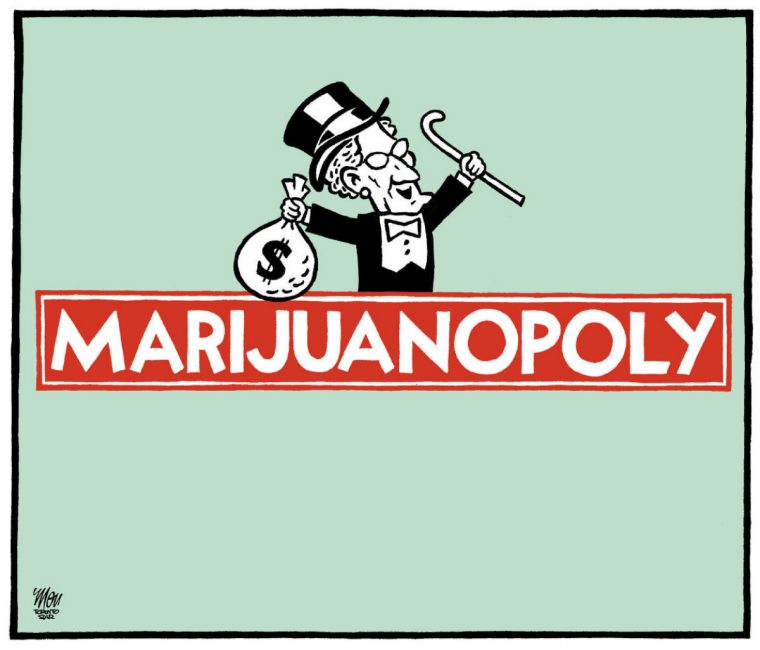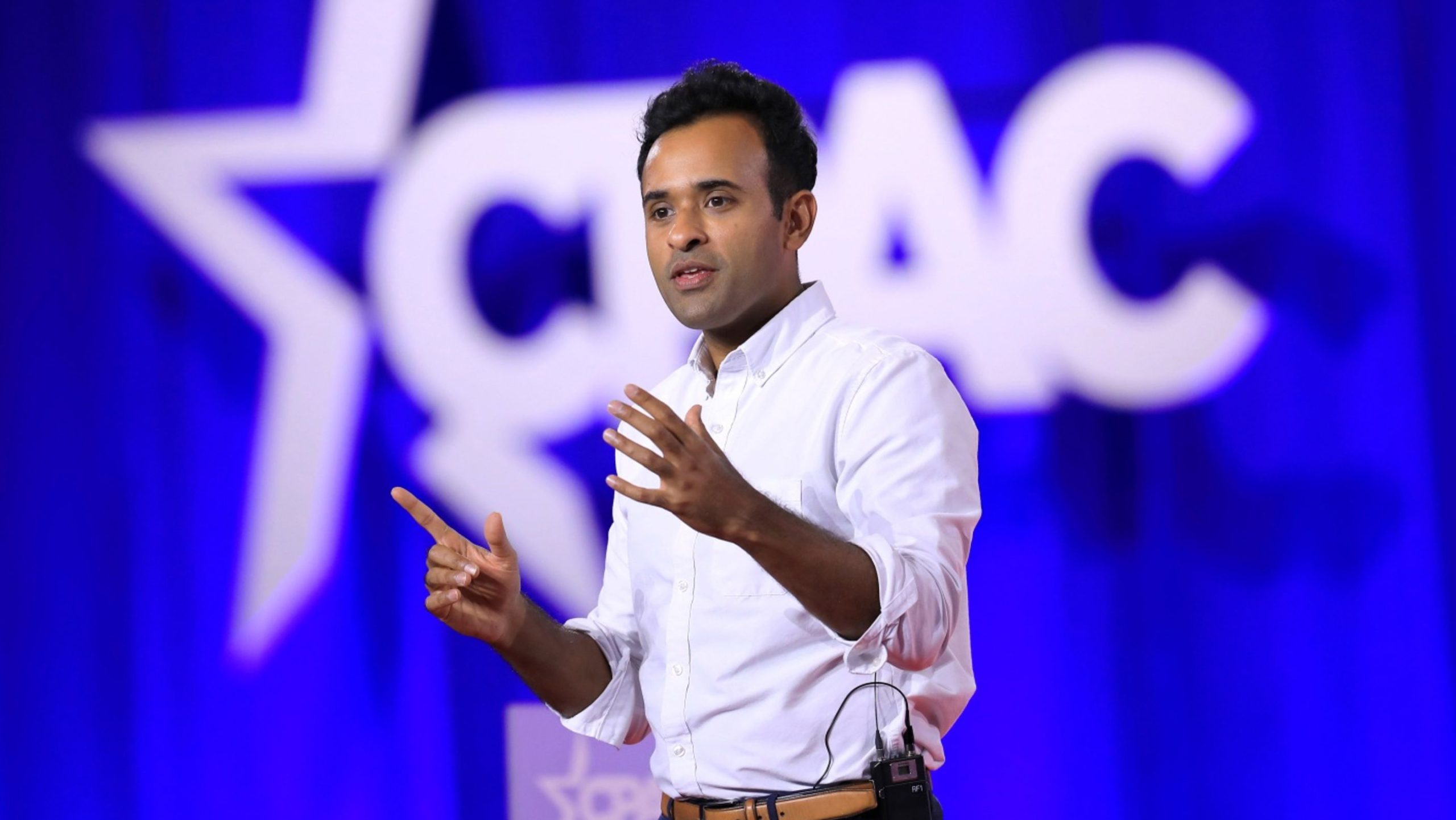All about Cannabis
An Anti-Monopoly Cannabis Toolkit? – Cannabis | Weed | Marijuana
Published
2 years agoon
By
admin
If one were to create an anti-monopoly cannabis toolkit, what would it look like? Fortunately, we don’t have to speculate. Parabola Center, a nonprofit think tank, has produced an anti-monopoly cannabis toolkit for us.
Of course, “woman of color” comprise this so-called “nonpartisan” group who want to put “prioritize people over profits.”
So you can be sure this toolkit will be less about cannabis liberalization and more about specific laws that – they feel – should be enacted.
While the think tank’s mission is to support cannabis policies that “put communities and small businesses first,” the road to hell is paved with good intentions.
So let’s examine what’s wrong with this so-called anti-monopoly cannabis toolkit. Let’s see if we can correct some of their mistakes by bringing in sound economics and a history of the Western legal tradition.
The anti-monopoly cannabis toolkit begins, “If you are concerned that big businesses are taking over the cannabis industry and you want to take action to prevent it from getting worse, this toolkit is for you.”
We begin on the same page. I am also concerned about “more domination and destruction caused by Big Tobacco, Big Alcohol, and Big Pharma.”
Yet, I am highly skeptical that there is legislation that will “limit the consolidation of corporate power and encourage open, competitive state markets.”
Unless it is legislation that repeals everything. Because it is the laws which enact more rules and regulations, even with good intentions, that lead to lobbying, corruption, and monopolies.
The authors say they base the information in the anti-monopoly cannabis toolkit on years of academic papers and “expert analysis.” And while that’s probably true – it’s within a particular mode of thought.
For example, the most significant thing we can do to build a better cannabis industry (and, consequently, a healthier economy and civil society) is to get the government out of the money-printing business.
Of course, bringing up the fraudulent practice of fractional reserve banking would take this anti-monopoly cannabis toolkit from mainstream respectability to the underworld of so-called right-wing misinformation.
So instead, they talk about creating “fair cannabis markets” by prioritizing “people over profits.” Which is the economic equivalent of believing the earth is flat.
Bad Ideas #1: Limit Cannabis Licences
The anti-monopoly cannabis toolkit suggests “policymakers should set limits on the number of licenses, stores, or square feet of cultivation space that one person or entity may own or control.”
One fails to see how politicians and bureaucrats limiting your business potential results in “fair cannabis markets.” Of course, the idea is that these limits would “prevent the establishment of massive cannabis companies that can use their deep pockets to crowd out smaller businesses.”
And you can see their point. In the beer industry, how many small craft brands are actually owned by large conglomerates? A lot. But, they did start as small craft brands.
The problem with lofty ideals like this is that they tend to ignore the nuances of reality. Namely, some consumers prefer large name-brand products to unfamiliar small businesses.
As well, how does a prominent cannabis company “crowd out” smaller businesses? Canada is perhaps the best example of a cannabis cartel. Large established medical producers were given the first recreational licences and were the first to get their product into the new legal stores.
Additionally, a ridiculous excise tax limits the potential of small businesses vis-a-vis the larger corporate guys.
But – despite all this, Canada’s small-to-medium cannabis companies still exist. Granted, they’re struggling. But that has more to do with foolish government regulations than “deep pockets” trying to crowd out smaller businesses.
Goods are Heterogeneous
A friend of mine lives near a Wal-Mart. The place is always busy. But directly across the Wal-Mart is a small boutique clothing shop. During the pandemic, she was concerned this clothing shop would go under. But it survived.
According to this anti-monopoly cannabis toolkit, this small boutique clothing shop should have been “crowded out” by the giant Wal-Mart across the street.
But consumers aren’t a homogenous blob. Nor is “clothing” a single staple. Likewise, cannabis comes in all shapes and sizes.
Giving governments the power to limit licenses and manipulate the cannabis market to reward “small businesses” will result in unintended consequences. It may even create the monopoly the toolkit wishes to prevent.
Never underestimate the power of corporate lawyers to find loopholes in your legislation. The best approach is to level the playing field by eliminating cannabis licenses.
Since when did Americans need to apply to the government to open a business?
Bad Idea #2: Limit Technology
Like the bad ideas above, the anti-monopoly cannabis toolkit sees tech platforms as a “major concern.”
They see some cannabis companies making exclusive contracts with delivery apps. They conclude that it’s unfair to those not included in the arrangements. That those without access to the delivery app are at a competitive disadvantage.
UberEats, for example, may sign an exclusive contract with Cannabis Company A. Because UberEats is more popular than, say, SkipTheDishes, Cannabis Companies B, C, and D are disadvantaged for not getting the UberEats contract.
The toolkit suggests legislation that reads: “A retail dispensary shall not market its cannabis products through an Online Platform that is operated by a third-party or fulfill any order referred to it by a third-party platform.”
How anyone takes this proposal seriously, I don’t know.
Like the above idea, this stems from “policy experts” that have gotten bogged down in their analysis instead of taking a step back and reading some Sowell or Hazlitt.
Bad Idea #3: Prevent “Vertical Integration”
This anti-monopoly cannabis toolkit suggests governments divide cannabis markets into multiple tiers, so a single company can’t be a grower, distributor, retailer, and processor.
Unless you’re a “microbusiness,” like a small farm that sells directly to consumers.
But when does a microbusiness become a regular business and thus be forced to sell its other assets? What about the economic benefits of vertical integration?
Is this an anti-monopoly cannabis toolkit or an anti-capitalist toolkit? It’s starting to feel like the latter.
In fact, this toolkit might be a good example of toxic femininity in our political culture, where what sounds right or compassionate outranks what is true. But I digress.
Anti-Monopoly Cannabis Toolkit: Things I Don’t Like Should Be Banned
Mergers and Acquisitions
According to this anti-monopoly cannabis toolkit, mergers and acquisitions are “anti-competitive,” and federal policymakers should prohibit them.
Of course, M&As get a bad rap because we don’t have a free and fair market economy. When one side of every transaction (the money) is controlled and manipulated by governments and crony bankers, the result is an unfree and unfair system.
A lot of people call the merger of corporate and state power fascism. But again, this kind of language would move the toolkit’s content from mainstream respectability to so-called right-wing misinformation.
Of course, M&As have their uses. Arbitrarily banning them due to the consequences of the Federal Reserve is like permanently turning off the water in your house because sometimes your basement floods.
It solves the flooding issue, but now you don’t have any running water.
Bad Actors
Finally, the anti-monopoly cannabis toolkit and I agree that individuals with drug-related convictions and records should be able to participate in the cannabis industry.
I take that stance because individuals are free. Therefore, if individuals working for Big Tobacco or Big Pharma also want in on the cannabis industry, I won’t argue. That’s their right as well.
Not according to this anti-monopoly cannabis toolkit. Since the authors want government licensing to continue, they want governments to bar corporations “with a history of harmful conduct” from entering the cannabis industry.
Why? Because they’ve been “defrauding the public and undermining public health.”
Of course, we have laws against fraud, so if that’s true, and governments have done nothing to stop this fraud, how exactly will empowering government bureaucrats solve this issue?
As Ludwig von Mises said, “If one rejects laissez faire on account of man’s fallibility and moral weakness, one must for the same reason also reject every kind of government action.”
Giving governments the power to bar specific individuals or companies based on their past actions is… well, it’s prohibition. By their logic, preventing individuals with drug-related convictions from entering the industry is perfectly valid.
Were they not “undermining public health” by selling illegal drugs before?
Anti-Monopoly Cannabis Toolkit: Support Small Businesses
The anti-monopoly cannabis toolkit says, “If the goal of anti-monopoly protections is to promote a fair and competitive marketplace, then limits on large corporations must also be combined with support for small and craft businesses.”
But do these supports include eliminating capital gain taxes or introducing commodity-backed money like gold or silver? Of course not. The toolkit suggests allowing small cultivators to sell their products directly to consumers—something they don’t want large cultivators to have.
The success of a small business does not come at the expense of large companies. And vice-versa. Goods are not homogenous. We can have a level playing field.
But of course, if your ideology insists on the equality of outcome rather than equality of opportunity, then the proposals in this anti-monopoly cannabis toolkit make sense.
Cannabis Monopoly is a Systemic Issue
The toolkit says, “Anti-competitive behaviors and monopolization in the legal cannabis industry are systemic problems that require systemic solutions.”
Of course, the term “systemic” needs defining. Often people refer to “systemic racism” when they mean cultural racism. But here, the problem is systemic.
One side of every transaction is money. And that money is disconnected from any scarce resource that would rein in inflation and resource depletion.
Elite bankers control the money we use in conjunction with corrupt governments. That’s the issue with the cannabis industry. It’s the same issue we have across the board.
But instead of addressing these core problems, we’re treated with this anti-monopoly cannabis toolkit. A children’s band-aid placed over a cancerous tumour.
And, to give them credit, the toolkit’s authors seem to understand this. They write, “If protecting banks isn’t your top concern, contact your legislators and tell them what your top concerns actually are.”
The problem is Americans already did that. In 2008 nobody wanted Wall Street banks bailed out. But legislators did it anyway. So Americans reacted with Occupy Wall Street. The establishment answered with “systemic racism.”
So now we’re back to fighting each other instead of the elite.
Politicians work for lobbyists, not voters. Schools, academia, and the corporate press easily manipulate and sway voters. Politicians can buy voters with their own money.
Suppose the U.S. government implements every single proposal in this anti-monopoly cannabis toolkit. What then? Will the authors return to life in the cannabis industry? Happy and content?
Or do they recognize the fundamental problems of anti-competitive behaviours and monopolization go beyond Big Weed?
Anti-Monopoly Cannabis Toolkit: The Good?
Of course, not everything smells of anti-capitalist nonsense in this anti-monopoly cannabis toolkit. The authors do write favourably about home cultivation.
[P]rotecting the right to cultivate cannabis at home for personal use and sharing is an important check on corporate power. It allows consumers and medical patients, rather than just companies, to determine what products are available, ensuring they have access to strains and medicines that meet their interests and needs. Allowing growing at home is also a symbolic statement that the cannabis plant belongs to people, not corporations.
Protecting this right is also an essential check on government power. But, presumably, the authors associate democratic governments with “the people.” Thus, anything the government does is really the collective action of the people.
So even here, I have to take issue with the language. “Allowing” growing at home is a symbolic statement that the government can (and will) still throw you in a cage for cannabis.
Whether it’s too many plants, too big of a plant, or a plant with genetics that have been outlawed (for example, high THC strains).
The only right people have is to private property. That’s where the right to cultivate cannabis comes from. It’s intrinsic to our sense of being. It’s our extended phenotype.
No government or corporation has the right to take that away.
Missing The Forest for the Trees
On the surface, this anti-monopoly cannabis toolkit seems full of good ideas. Our concerns are the same. They write, “We expect to see even more aggressive action by harmful corporations to co-opt the legalization movement.”
And indeed, Canadians have already experienced this. The entire legalization scheme was an attempt to displace the B.C. Bud market and implement a top-down corporate structure.
But Canadians don’t want Big Weed. They want small, craft cultivators. And at the end of the day, in a free and fair market, consumers are in charge.
They decide who will “control the industry.” But only if the market is free and fair. That means everyone has equal opportunity. Whether it’s a small cannabis company expanding into a larger one. Or an already-established corporation testing the waters of legal weed.
If taxes are low, regulations and licenses are nonexistent (or issued by private, competitive accreditation agencies), and “intellectual property rights” are abolished – what power does a corporation have that a small business doesn’t?
Power rests with the consumer. Rather than address that fact, this anti-monopoly cannabis toolkit adds layers of rules and bureaucracy to an already bloated industry.
The more laws and regulations the government enacts, the costlier it becomes to do business. This means large corporations will have an advantage over the smaller guys.
Econ 101
It’s like taxes. When people demand rich pay their “fair share,” do they think through what they’re saying?
You’re either rich enough to hire tax lawyers to find every loophole in the book, so you pay little to nothing. Or you’re poor enough that the government gives you money.
The last place you want to be is in the middle class, where over 50% of your income will eventually see the inside of government coffers.
Likewise, in the cannabis industry. You either want to be a large corporation that can lobby its way to success. Or an employee who takes home a paycheque whether the business is profitable or not.
The last thing you want to be is the owner of a small-to-medium cannabis business. They’ve stacked the system against you. And nothing in this anti-monopoly cannabis toolkit addresses the systemic issue at hand.
Governments have gotten too large and too powerful. And that is the only source of corporate power. Outside of government privileges, the only way to profit is by providing goods and services to people on a consensual basis.
Suppose government concerns itself with national defence, and that’s it. Everything else is in a free market. And suppose you make billions and acquire a natural monopoly in the cannabis market by providing cannabis goods and services to people.
(And remember, competitors can displace a “natural” monopoly. No laws are preventing other businesses from operating).
Is this anti-monopoly cannabis toolkit still relevant? Or is anti-capitalism the real motivation behind this? A fetish for small businesses and an irrational hatred of anyone who makes more money than you.
Instead of implementing the policies in this toolkit, why not liberalize legalization?
You may like
-


Getting THC Edibles in Your Edible Arrangement?
-


Is Cannabis Legal in California Right Now?
-


Germany: Trial against operator of Trier cannabis vending machine discontinued
-


The best energizing THC gummies of 2025 by Leafly
-


Mixed Messages From The Feds About Cannabis
-


Humboldt County extends deadline to pay marijuana cultivation taxes
All about Cannabis
Five Cannabis Stories You Might Have Missed – Cannabis | Weed | Marijuana
Published
1 year agoon
October 3, 2023By
admin
What are the five cannabis stories you might have missed? Nowadays, it’s impossible to keep up with cannabis news stories across the world. Whether it’s banking reform and rescheduling in the United States, legalization in Europe or Thailand, or Canada’s experiment with corporate legalization.
Here are five cannabis stories you might have missed.
Five Cannabis Stories You Might Have Missed
Suing Over Cannabis Rescheduling
U.S. Attorney Matthew Zorn is suing the Biden Administration over cannabis rescheduling, particularly over the secrecy of it all. If you missed this cannabis story, here are the details.
Last month, the U.S. Health and Human Services Department (HHS) sent a letter to the Drug Enforcement Administration (DEA) suggesting they reschedule cannabis.
Currently, the U.S. government lists cannabis as a Schedule 1 drug, in the same category as heroin. The HHS letter suggests it should be a Schedule 3. Cannabis would still be a controlled substance but with fewer restrictions.
U.S. Attorney Matthew Zorn has filed an official complaint in the U.S. District Court. He says the letter “has become an item of public interest.” He has asked the court to force the Biden Administration to release “improperly held agency records.”
Zorn tried a Freedom of Information Act request but to no avail. HHS “has not produced the requested record” and “did not make a timely determination within 20 days,” the complaint alleges.
60% Higher Risk of Cardiovascular Problems Linked to “Cannabis Use Disorder”
Another day, another study finding an “association” between cannabis and something terrible. This time, it’s cardiovascular problems. You haven’t missed much if you missed this cannabis news story.
Here are some problems with the study:
Correlation is not Causation. Like most of these “cannabis is bad for you” studies, the researchers have merely made an association. Fortunately, this study explicitly states there is no causation. They simply found an association after controlling for variables.
Confounding Variables. While the study adjusts for some variables, it says it cannot account for tobacco smoking due to data limitations. This is obviously a significant limitation.
Smoking cigarettes is a far more significant risk factor for cardiovascular diseases than smoking cannabis.
Not being able to parse out this variable makes the study beyond useless. It’s literally disinformation. If you missed this cannabis news story, then you’re better off for it.
Five Cannabis Stories You Might Have Missed
Sampling Cannabis in British Columbia
You might have missed this cannabis story out of British Columbia, Canada.
After years of stigma and drug war propaganda, the British Columbia government is finally starting to loosen their cannabis rules and regulations.
Licensed producers can now provide samples for retailers. The Grow Up Conference and Expo was the first cannabis industry event to take advantage of the new rules.
Advocates say the new regulations will benefit the industry in several ways. Retailers will now be able to see the product they’re buying and sample it for their customers.
Unfortunately, retailers cannot provide samples to customers yet. But the industry is hopeful that it’s in the works. That’s undoubtedly a cannabis new story we wouldn’t want to miss.
Thailand To Reconsider Cannabis Decriminalization
You might have missed this vital cannabis news story: Thailand may re-criminalize cannabis.
Two years ago, Thailand became the first Asian country to decriminalize cannabis. But its government, led by Prime Minister Srettha Thavisin, has vowed to roll back cannabis legalization.
In an interview with Bloomberg Television in New York while attending the UN General Assembly, Srettah made clear that residents of the country will only be able to use cannabis for medical reasons.
“It’s just for medical reasons. We need to rewrite the law,” he said.
Current legislation has cannabis removed from a list of narcotics. Individuals are supposed to notify their local government if they want to cultivate plants at home. But so far, the government has not created any regulations regarding cultivation and sales.
This regulatory vacuum has created a “free-for-all” industry much like the “wild-west” of British Columbia before Justin Trudeau’s corporate cannabis takeover.
While some estimated Thailand’s cannabis market may be worth nearly $2 billion, the new government ensures that money will remain in the black market.
Five Cannabis Stories You Might Have Missed
SAFER Banking Almost a Reality
We covered this one, but you might have missed this important cannabis news story.
Less than a week after being re-introduced, the SAFER Banking Act found approval by the Senate Banking Committee on September 27. The committee voted 14-9 to advance the legislation to the Senate floor.
The text of the new amendment is not yet available publicly. But give it enough time, and U.S. Attorney Matthew Zorn may sue to get the details released.
But overall, thanks to this committee, the movement toward cannabis reform in the United States just got a shot in the arm.
All about Cannabis
What is Vivek Ramaswamy’s Position on Cannabis? – Cannabis | Weed | Marijuana
Published
1 year agoon
October 2, 2023By
admin
What is Vivek Ramaswamy’s position on cannabis? “You don’t hear me talk about the war on drugs. I’m not a war on drugs person,” Ramaswamy said when he appeared at a Free State Project event in New Hampshire last June.
Vivek Ramaswamy is an American entrepreneur seeking the Republican nomination to run for President of the United States.
Ramaswamy told the crowd he was “probably the only person in the modern history” of the Republican Party to talk about decriminalizing drugs for people with PTSD and other mental health problems.
“Psychedelics,” he said specifically. “From ayahuasca to ketamine… That’s gotta be part of the solution.”
But what is Vivek Ramaswamy’s position on cannabis? He told Fox News:
We got to catch up with the times. It’s not a popular position in the Republican Party, but I’d just, again, I guess I’m going to speak the truth. Whether you vote for me or not is your choice. I think the time has come to decriminalize it.
Later, a spokesperson from his campaign said:
The current state-level ‘legalization‘ farce contributes to the culture of lawbreaking. It’s literally against the law. For us to pretend otherwise only undermines the rule of law in this country. For that reason, Vivek favors the federal legalization of marijuana.
What is Vivek Ramaswamy’s Position on Cannabis?
What is Vivek Ramaswamy’s Position on Cannabis? Decriminalization or legalization? Once upon a time, those meant the same thing. And indeed, in America, this may still ring true.
Vivek isn’t shy about wanting to rule by executive fiat. Suppose he’s the next U.S. President and unilaterally deschedules cannabis. Not a rescheduling, a complete descheduling.
As far as the federal government is concerned – cannabis is not its business.
Is that decriminalization or legalization? For operators in legal states, it certainly helps their tax situation. And why would the financial system fear a plant the government has delisted as a controlled substance?
Is that legalization or decriminalization? Or are those terms synonymous?
If a Ramaswamy Administration removed cannabis from the Controlled Substances Act entirely, there would be a few implications.
Implications of De-Scheduling Cannabis
Vivek Ramaswamy’s position on cannabis could empower state-level regulations. If the federal government takes a literal hands-off approach, you could argue that’s not legalization.
But is legalization ideal? Should Washington D.C. force states like Idaho to legalize? Suppose people in Idaho want to consume cannabis legally. There are 23 other states they can move to, including next-door neighbors.
Even if all 50 states legalized – isn’t it better to have local regulation of a competitive and complex modern industry? Think of the supply chain: cultivation, production, packaging, distribution, sales, marketing, and everything in between.
Do you want D.C. bureaucrats in charge of all that? Isn’t that how lobbyists capture the process and rig the rules against the little guys?
When The Feds Do Get Involved
Of course, some will argue Vivek Ramaswamy’s position on cannabis can’t be entirely hands-off. Somebody is going to have to regulate interstate commerce and international trade.
Imports and exports are federal jurisdiction and always have been. Of course, Vivek’s brand of governing may detest interstate regulation. A Ramaswamy Administration may create a free-for-all for all industries, not only cannabis.
One can hope.
And, of course, FDA bureaucrats will want to control aspects of cannabis, especially if it’s used in food products or marketed as a medical treatment. In a sense, descheduling and taking a hands-off approach empowers the existing bureaucracy.
But Vivek can use the stroke of the Presidential pen and tell the FDA to buzz off. Such is the state of the American “republic.”
Of course, if Vivek Ramaswamy becomes President, he won’t be able to decline the tax revenue. Who can, really? Except for maybe Ron Paul.
So, the federal government may tax cannabis. And so Vivek Ramaswamy’s position on cannabis matters a great deal.
But there’s something else. And it involves Vivek’s policy on the Federal Reserve Bank.
Vivek Ramaswamy’s Position on Cannabis & Money Could Change the World
Vivek Ramaswamy’s position on cannabis and money could change the world. And here’s how.
Experts must control money. That’s what the experts say. That’s why supply and demand don’t determine interest rates. You can’t trust free markets, they say. You need a central planning committee of experts.
But when the hell has that ever worked? This is not the 1920s, this is the 2020s. We have evidence of central planning, and the results are far worse than any of the theoretical excesses of free-market capitalism.
But suppose the experts are right about one thing. The price of money is too volatile to leave to a truly random process. That there should be a more market-based approach to price stability.
As in, leave it to the experts, but not the boardroom suits. Leave it to the people who are actually buying and selling in the market on a daily basis.
Like Vivek Ramaswamy’s position on cannabis, his proposal for the Federal Reserve is a breath of fresh air—a novel idea in an age of corporate-state shallowness.
What is a Government Gold Standard?
A country on a gold standard exchanges its currency for gold at a fixed rate, say, $35 an ounce. And vice versa. So, if the market price of gold goes beyond $35, people bring in their dollars to exchange for gold.
This process means the number of dollars in circulation decreases, so the value of the dollar increases. This continues until the market price of gold is back to $35.
If the market price drops below $35, the same process works in reverse. Historically common, it’s not without its flaws. Governments tinker with the mechanism like a curious 12-year-old who takes apart the television to see how it works (and ends up breaking it in the process).
A gold standard keeps the value of the money constant relative to the market price of gold. Economists have all kinds of critics and rebuttals as to why that wouldn’t work today in the “modern” economy.
To their credit, relying on gold as the sole commodity backing the government currency does run into problems. Especially when governments are always trying to cheat the system.
Vivek Ramaswamy’s position on cannabis stems from listening to the people and the real experts (i.e. not “public health”). He is responding with the correct answers. He has – more or less – done the same with the subject of the Federal Reserve and the money.
What is a Commodity Bundle Standard?
Vivek Ramaswamy should combine his positions on money and cannabis.
Vivek wants a commodity bundle standard to help solve the problem of using government currency. In this system, the market defines the U.S. Dollar as a collection of commodities. This collection or bundle is valued by what’s in it.
For example, suppose you had one million dollars. You take it to the bank and demand your bundle. It could consist of a few pounds of gold and silver, but it’d mostly be a claim on commodities (i.e. 100 pounds of grade A beef, 10 barrels of crude oil, 1,000 board feet of lumber).
Likewise, anyone who brings in a bundle (the claim on commodities) gets a million dollars. This keeps the bundle’s price at a million dollars and, thus, a stable purchasing power, assuming nobody is messing with the bundle.
Vivek Ramaswamy’s Position on Cannabis & Money Could Change the World
Vivek Ramaswamy could combine his positions on money and cannabis by including 1,000 pounds of industrial hemp biomass and 500 grams of premium-grade cannabis flower in the commodity bundle.
Regarding “changing the world,” you’ll have to refer to some of our past posts on the subject.
The main takeaway: eliminating the elite’s ability to create money out of thin air and charge interest on it can only be construed as a step in the right direction.
In fact, it’s the first step.
All about Cannabis
Regulating Cannabis like Fish – Cannabis | Weed | Marijuana
Published
2 years agoon
September 29, 2023By
admin
Regulating cannabis like fish? Excuse me, what? According to Leah Heise, the cannabis industry can learn much from commercial fishing.
An accomplished cannabis exec, Leah’s been the CAO of Ascend Wellness Holdings, the CEO of Women Grow, CXO of 4Front Ventures and President of Chesapeake Integrated Health Institute.
While at Ascend, Leah focused on growing the business from 73 employees to more than 1300 in less than 18 months, taking the company from $19M in revenue in 2019 to a $1.6B market cap in 2021.
Leah is also a medical cannabis patient, having discovered the herb after being hospitalized over 35 times for pancreatitis.
Leah Heise is a cannabis expert. Her expertise is unparalleled, unlike the so-called “experts” in the media who spew drug war propaganda.
So when she says the cannabis industry has much to learn from commercial fisheries, our ears perk up.
Regulating cannabis like fish? Say what?
Regulating Cannabis from Stigma
Having experience in the regulatory landscape, Leah knows what’s working and what’s doomed to fail. And unfortunately, most legal states have been regulating cannabis from a position of stigma.
“We do everything by piecemeal, by litigation. It’s very costly to the system and there’s just a better, more streamlined way to do it,” says Leah. “And I think that potentially regulating it similar to a commercial fishing industry may be the way to do it.”
Of course, Leah points out that there are other options, and this is just one of many ideas. But, she says, “These regulators need to understand the things they are regulating.”
“They’re doing it from a place of stigma and lack of education,” Leah says. “We have to turn back one hundred years of stigma and propaganda.”
Whether it’s racial stigma or false beliefs that cannabis will rot your brain, Leah emphasizes education. From scientific papers proving cannabis’ efficacy to patient stories to studies that associate legal cannabis with fewer cases of domestic abuse and alcoholism.
“The industry and the plant need a rebrand,” says Leah. “It’s not Cheech and Chong. It’s everyone; it’s diverse. Anybody could be using this, from your great-grandmother to your child, depending on what they have. It’s not going to make their brains die or reduce IQ.”
Regulators Need Education
Simply put, the public (and many regulators) are uneducated on cannabis. Drug warriors amplify its alleged harms while marginalizing its medical and therapeutic benefits.
But how would regulating cannabis like fish help? Leah admits that if the feds get involved, a strong regulatory body needs to be created.
“Or just let the states do it,” she says. “We don’t necessarily need another layer on top.”
But suppose the federal government does step in and institute national cannabis regulations. What can we learn from the commercial fishing industry?
Regulating Cannabis like Fish
What can the cannabis industry learn from commercial fishing? How does one regulate cannabis like fish?
“Fisheries is a highly regulated industry,” says Leah. “Because the government’s trying to balance the interests of the environmental groups with the interest of the commercial fishing industry.”
Yes, they are separate products, but both are natural and come from the Earth. Likewise, generations of people work in the industry, whether it’s multiple generations of fishermen (and women). Or the legacy farmers in the cannabis industry (especially in black and brown communities).
With the commercial fishing industry, there’s the problem of overfishing. “In an effort to save the planet, and the fisheries themselves, the federal government has stepped in,” says Leah.
And she sees opportunities for the cannabis industry and its regulators to learn from the commercial fishing industry.
Commercial fishing regulators don’t regulate from a place of stigma. “I haven’t seen a single state,” says Leah, referring to legal cannabis states, “where there’s not a massive lawsuit. And even with Schedule III, there’s going to be lawsuits.”
Learning from the Commercial Fishing Industry
Leah prefers a more comprehensive way of regulating cannabis, which borrows from the successes of the commercial fishing industry.
“They design things called fishery management plans,” she says. “Scientists in the government will come forward and say, ‘okay we’re starting to see Atlantic sea scallops start to collapse. We’re seeing a decline in the number of new pollock. And we need to come up with a fishery management plan to work this.’”
Leah says the commercial fishing industry has councils with different stakeholders, from environmental groups to commercial industries to recreational groups.
“They come together to regulate themselves,” says Leah. “It speeds up the process and really eliminates a lot of the issues in terms of getting sued, because stakeholders at least feel like they have a voice.”
“Nobody walks away happy,” Leah adds. “Which is kind of what happens with any real decent negotation, right? Everybody’s giving a little.”
Leah thinks having a board of stakeholders would prevent things like canopy caps or taxing inside the supply chain. Things that ultimately hurt the industry and only empower illicit markets.
The problem, says Leah, is that current cannabis regulators “aren’t holistically looking to see what the impacts are,” of the various regulations they’ve instituted.
Regulating Cannabis like Fish – Unintended Consequences?
Is there any state already doing this? What are the odds D.C. will create cannabis regulations that embody the principles of the commercial fishing industry?
One of the biggest problems, says Leah, is the lack of money on the enforcement side. From her regulator days, Leah recalls:
We were handed often times very dense regulations to enforce. But we weren’t given the money that we needed to be given to it, to hire the people, and train the people we needed to actually enforce those regulations.
The result is cannabis operators openly flaunting the rules because paying the fines is sometimes cheaper than observing the regulations.
There’s also debate on how heavy cannabis regulations should be. Should we regulate it like alcohol? Or should we consider cannabis a vegetable no more dangerous than a carrot?
“I think that the polarization that exists in this industry exists in the country,” says Leah, so there’s no easy answer.
Unintended Consequences
But one thing to watch out for is the unintended consequences of regulation. Leah recalls visiting Africa, particularly Botswana, about a year ago.
“The Gates Foundation had contributed billions of dollars worth of mosquito nets,” Leah recalls.
They thought that giving people mosquito nets would eliminate malaria. But what they didn’t understand is that [the Bostwanans] needed food. So what the people did was they used the nets to fish with. But the nets were covered with pesticides. It killed off all the fish. And you still have malaria, and you have no food, and it’s because there wasn’t really a holistic decision in that instance. [The Gates Foundation] wasn’t informed enough to answer what the real primary need was.
Unintended consequences are an unavoidable fact of life. In Canada, for example, the government legalized cannabis from a position of stigma and propaganda. The result is a thriving black market catering to consumer demands the legal market can’t fulfil.
With that in mind, we asked Leah how likely, on a scale of one to ten, would the United States legalize and regulate according to rational and holistic principles? Will authorities regulate cannabis like fish?
If ten is the ideal and one is stigma and propaganda, what’s the verdict?
“I think it’s going to be less than 5,” says Leah. And like the situation in Canada or the more restricted US legal states, the consequences of regulating from stigma suggest a robust illicit market.
“You can decide to go the legal route or you can decide to go the illegal route,” says Leah. “But you’re not going to make it go away.”

Getting THC Edibles in Your Edible Arrangement?

Is Cannabis Legal in California Right Now?

Germany: Trial against operator of Trier cannabis vending machine discontinued

The best energizing THC gummies of 2025 by Leafly

Mixed Messages From The Feds About Cannabis

Humboldt County extends deadline to pay marijuana cultivation taxes

How Hemp Helps You Sleep

420 in Texas is at Reggie & Dro

Daily Cannabis Use Can Help People Get Off Opioids (STUDY)

The Future of Cannabis and Sleep Medicine

Distressed Cannabis Business Takeaways – Canna Law Blog™

United States: Alex Malyshev And Melinda Fellner Discuss The Intersection Of Tax And Cannabis In New Video Series – Part VI: Licensing (Video)

What you Need to Know

Drug Testing for Marijuana – The Joint Blog

NCIA Write About Their Equity Scholarship Program

It has been a wild news week – here’s how CBD and weed can help you relax

Cannabis, alcohol firm SNDL loses CA$372.4 million in 2022

A new April 20 cannabis contest includes a $40,000 purse

Your Go-To Source for Cannabis Logos and Designs

UArizona launches online cannabis compliance online course
Trending
-

 Cannabis News2 years ago
Cannabis News2 years agoDistressed Cannabis Business Takeaways – Canna Law Blog™
-

 One-Hit Wonders2 years ago
One-Hit Wonders2 years agoUnited States: Alex Malyshev And Melinda Fellner Discuss The Intersection Of Tax And Cannabis In New Video Series – Part VI: Licensing (Video)
-

 Cannabis 1012 years ago
Cannabis 1012 years agoWhat you Need to Know
-

 drug testing1 year ago
drug testing1 year agoDrug Testing for Marijuana – The Joint Blog
-

 Education2 years ago
Education2 years agoNCIA Write About Their Equity Scholarship Program
-

 Cannabis2 years ago
Cannabis2 years agoIt has been a wild news week – here’s how CBD and weed can help you relax
-

 Marijuana Business Daily2 years ago
Marijuana Business Daily2 years agoCannabis, alcohol firm SNDL loses CA$372.4 million in 2022
-

 California2 years ago
California2 years agoA new April 20 cannabis contest includes a $40,000 purse























